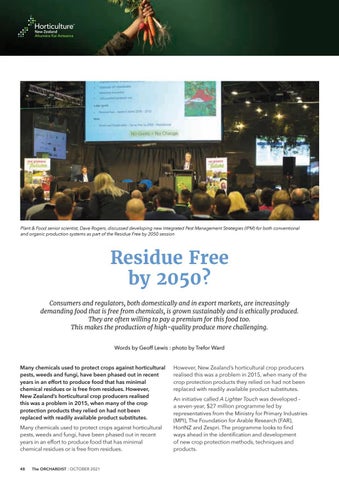Plant & Food senior scientist, Dave Rogers, discussed developing new Integrated Pest Management Strategies (IPM) for both conventional and organic production systems as part of the Residue Free by 2050 session
Residue Free by 2050? Consumers and regulators, both domestically and in export markets, are increasingly demanding food that is free from chemicals, is grown sustainably and is ethically produced. They are often willing to pay a premium for this food too. This makes the production of high-quality produce more challenging. Words by Geoff Lewis : photo by Trefor Ward Many chemicals used to protect crops against horticultural pests, weeds and fungi, have been phased out in recent years in an effort to produce food that has minimal chemical residues or is free from residues. However, New Zealand’s horticultural crop producers realised this was a problem in 2015, when many of the crop protection products they relied on had not been replaced with readily available product substitutes. Many chemicals used to protect crops against horticultural pests, weeds and fungi, have been phased out in recent years in an effort to produce food that has minimal chemical residues or is free from residues. 48
The ORCHARDIST : OCTOBER 2021
However, New Zealand’s horticultural crop producers realised this was a problem in 2015, when many of the crop protection products they relied on had not been replaced with readily available product substitutes. An initiative called A Lighter Touch was developed – a seven-year, $27 million programme led by representatives from the Ministry for Primary Industries (MPI), The Foundation for Arable Research (FAR), HortNZ and Zespri. The programme looks to find ways ahead in the identification and development of new crop protection methods, techniques and products.
